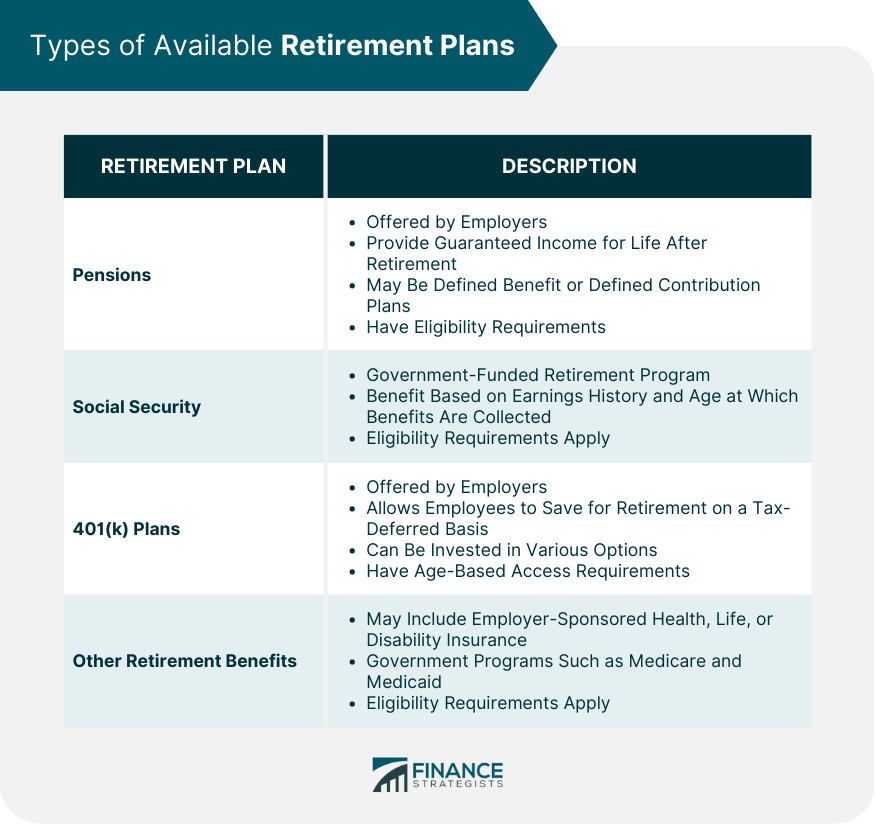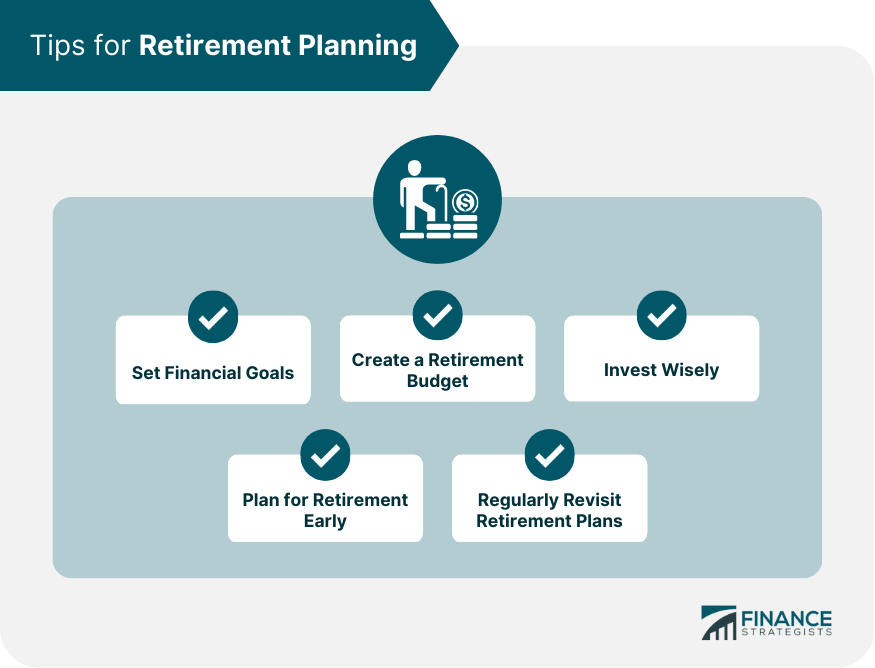Retirement is the act of leaving a job or ceasing to work. It is a common practice in many countries and has evolved over time. It is usually associated with the end of the working life of an individual and is often seen as a time for relaxation and leisure. In a legal or financial context, retirement can also refer to the process of receiving retirement benefits, such as pensions, Social Security, or 401(k) plans. Retirement has not always been a common practice. In the past, people often worked until they were physically unable to do so. However, in the late 1800s and early 1900s, retirement became more prevalent in industrialized countries. It was seen as a way to create job opportunities for younger workers and to provide older workers with a period of rest after a lifetime of work. The retirement age varies from country to country and depends on many factors. Factors that can affect retirement age include the type of work, health, financial status, and personal preferences. In the United States, the full retirement age for Social Security benefits is currently 67 for those born in 1960 or later. However, many people choose to retire earlier or later than this age, depending on their financial situation, health, and personal goals. The retirement age also varies by industry. For example, athletes and performers may retire in their 30s or 40s, while professors and researchers may work well into their 70s or 80s. Some companies have mandatory retirement ages, while others allow employees to work as long as they can. However, someone with health problems may need to retire earlier than planned. If someone has not saved enough for retirement, they may need to work longer to increase their retirement savings, however, late starters can adopt a retirement planning strategy to save enough. Personal preferences, such as wanting to spend more time with family or pursuing hobbies, may also influence retirement age. Retirement benefits are an important part of retirement planning, as they can provide a significant source of income during retirement. Pensions are retirement plans that are offered by employers and provide a guaranteed income for life after retirement. Pensions may be defined benefit plans or defined contribution plans. Defined benefit plans promise a specific monthly benefit based on factors such as years of service and salary, while defined contribution plans allow employees to contribute a portion of their income to a retirement account, which is then invested and can grow over time. To access a pension benefit, an employee typically needs to meet certain requirements, such as reaching a certain age or working for the company for a specified number of years. Pensions may also have vesting requirements, which means that an employee needs to work for a certain number of years before they are eligible for the pension benefit. Social Security is a government-funded retirement program that benefits eligible retirees monthly. To be eligible for Social Security, an individual must have worked for at least 10 years and paid Social Security taxes. The Social Security benefit amount is based on the earnings history of an individual and the age at which they start collecting benefits. Social Security benefits can be accessed by applying online, by phone, or in person at a Social Security office. The amount of the benefit can be affected by factors such as when someone starts collecting benefits and how much they earned during their working years. 401(k) plans are retirement plans that are offered by employers and allow employees to save for retirement on a tax-deferred basis. Getting this plan also entails several advantages that will help prepare for the future. Contributions to a 401(k) plan are made on a pre-tax basis, which means that the contribution is deducted from income before taxes of an employee are calculated. The money in the 401(k) plan can then be invested in various investment options, such as stocks, bonds, and mutual funds. To access a 401(k) plan, an employee typically needs to be enrolled and contribute to the plan. The money in the 401(k) plan can be accessed penalty-free after age 59 1/2. Withdrawals made before age that age may be subject to a penalty. In addition to pensions, Social Security, and 401(k) plans, other retirement benefits may be available to retirees. These benefits may include employer-sponsored health, life, or disability insurance. Retirees may also be eligible for government programs such as Medicare and Medicaid. Accessing other retirement benefits may depend on the specific program and eligibility requirements. It is important to understand what benefits are available and how to access them to ensure a financially secure retirement. Retirement planning is a crucial aspect of financial planning, and it is important to start planning early and revisit plans regularly. Determine how much money will be needed in retirement and create a plan to save and invest accordingly. To set financial goals, individuals should consider factors such as anticipated living expenses, desired lifestyle, and anticipated retirement age. Identify and estimate expenses such as housing, healthcare, and leisure activities. Once these expenses are determined, creating a budget and saving are important. Creating a budget will also help identify areas where expenses can be reduced, freeing up more money for retirement savings. It involves choosing the right mix of investments to help grow retirement savings over time. You may also diversify investments to reduce risk and maximize returns. It is important to consider factors such as age, risk tolerance, and investment goals when making investment decisions. Starting early allows individuals to take advantage of the power of compounding interest and to make smaller, more manageable contributions over time. Waiting too long to start planning for retirement can make saving enough money to meet retirement goals difficult. Retirement planning is not a one-time event. Regularly revisiting retirement plans is important to ensure they are on track. This includes updating financial goals, revising retirement budgets, and adjusting investment strategies. Life events such as marriage, children, and unexpected expenses can also impact retirement plans and should be considered when revisiting plans. The best time to retire depends on various factors, including financial situation, health, and personal goals of an individual. In general, retirement is recommended when an individual has reached their full retirement age and has sufficient retirement savings to support their desired lifestyle. Many people choose to retire earlier or later than 67, depending on their financial situation and personal goals. Retiring earlier may be an option for those who have saved enough money to support their retirement lifestyle, while others may need to work longer to increase their retirement savings. Health issues or a desire to pursue certain hobbies or interests may influence the decision to retire earlier. In contrast, others may choose to work longer to remain active and social or to increase their retirement savings. Ultimately, the best time to retire is a personal decision that should be based on individual financial, health, and personal circumstances. Retirement can be a time of relaxation, travel, and pursuing hobbies and interests. Many retirees choose to travel, volunteer, or spend time with family and friends. However, retirement can also present challenges like loneliness, health issues, and financial strain. Loneliness can be a common issue in retirement, especially for those who live alone or have lost friends and family members. Staying active and socializing with others can help combat feelings of loneliness. Health issues can also be a concern in retirement. As people age, they may experience health problems that require medical care, impacting their quality of life. It is important for retirees to take care of their health by staying active, eating a healthy diet, and seeking medical care when necessary. Financial strain can also be a challenge in retirement, especially for those who have not saved enough or experienced unexpected expenses. It is important to have a solid retirement plan and to make wise financial decisions to ensure a financially secure retirement. Retirement is the act of leaving a job or ceasing to work and has become a common practice in many countries. Retirement benefits such as pensions, Social Security, and 401(k) plans can provide a significant source of income during retirement. Retirement planning is crucial, and setting financial goals, creating a retirement budget, and investing wisely are important steps to ensure a financially secure future. It is also important to plan for retirement early and revisit plans regularly, as life events can impact retirement plans. Retirement can be a time of relaxation, travel, and pursuing hobbies and interests, but it can also present challenges such as loneliness, health issues, and financial strain. To ensure a financially secure retirement, consulting with a financial advisor may be helpful. A financial advisor can provide personalized advice on retirement planning, including setting financial goals, creating a retirement budget, and investing wisely. Definition of Retirement
Retirement Age
Retirement Benefits
Pensions
Social Security
401(k) Plans
Other Retirement Benefits

Retirement Planning
Set Financial Goals
Create a Retirement Budget
Invest Wisely
Plan for Retirement Early
Regularly Revisit Retirement Plans

When Is the Right Time to Retire
Life in Retirement
Final Thoughts
What Does Retired Mean? FAQs
Retirement is the act of leaving a job or ceasing to work, often associated with the end of an individual's working life, providing them with a period of relaxation and leisure.
Retirement benefits are an important part of retirement planning and can provide a significant source of income during retirement. These benefits may include pensions, Social Security, and 401(k) plans.
Retirement planning is a crucial aspect of financial planning, and it is important to start planning early and revisit plans regularly. Some important steps include setting financial goals, creating a retirement budget, investing wisely, planning for retirement early, and regularly revisiting retirement plans.
The best retirement time depends on various factors, including financial situation, health, and personal goals. In general, retirement is recommended when an individual has reached their full retirement age and has sufficient retirement savings to support their desired lifestyle.
Retirement can present challenges like loneliness, health issues, and financial strain. Retirees need to take care of their health, stay active, and socialize with others to combat loneliness. Additionally, having a solid retirement plan and making wise financial decisions can help ensure a financially secure retirement.
True Tamplin is a published author, public speaker, CEO of UpDigital, and founder of Finance Strategists.
True is a Certified Educator in Personal Finance (CEPF®), author of The Handy Financial Ratios Guide, a member of the Society for Advancing Business Editing and Writing, contributes to his financial education site, Finance Strategists, and has spoken to various financial communities such as the CFA Institute, as well as university students like his Alma mater, Biola University, where he received a bachelor of science in business and data analytics.
To learn more about True, visit his personal website or view his author profiles on Amazon, Nasdaq and Forbes.















